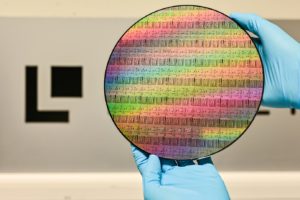
EDACafe Editorial Roberto Frazzoli
Roberto Frazzoli is a contributing editor to EDACafe. His interests as a technology journalist focus on the semiconductor ecosystem in all its aspects. Roberto started covering electronics in 1987. His weekly contribution to EDACafe started in early 2019. AI startups; microLED-based interconnect; silicon nitride photonics; cloud-native automotive software; new solid-state LiDARSeptember 17th, 2021 by Roberto Frazzoli
Artificial Intelligence updates – in terms of new IP and new startup funding – make up a significant part of this week’s news roundup, while other recurring themes include optics/photonics applications and IoT security. AI updates: Cadence, Deep Vision, Axelera Cadence has unveiled its Tensilica AI Platform for AI SoC development, including three product families for the low, mid and high end. Built upon the Tensilica DSPs, the Tensilica AI Platform adds a new companion AI neural network engine (NNE) and neural network accelerators (NNAs). The “AI Base” family includes the Tensilica HiFi DSPs and ConnX DSPs, combined with AI instruction-set architecture extensions. The “AI Boost” family adds a companion NNE, initially the Tensilica NNE 110 AI engine, which scales from 64 to 256 GOPS. The “AI Max” family encompasses the Tensilica NNA 1xx AI accelerator family—currently including the Tensilica NNA 110 accelerator and the NNA 120, NNA 140 and NNA 180 multi-core accelerator options—which integrates the AI Base and AI Boost technology. The multi-core NNA accelerators can scale up to 32 TOPS, while future NNA products are targeted to scale to 100s of TOPS. Targeting intelligent sensor, IoT, audio, mobile vision/voice AI and ADAS applications, the Tensilica AI Platform features a common software platform and – according to Cadence – delivers optimal power, performance and area. Deep Vision has received $35 million in a Series B financing round led by Tiger Global. Deep Vision’s AI processor, named ARA-1, targets camera-based applications such as smart retail, driver-monitoring systems, smart city, drones, and factory automation. The company’s processor also provides natural language processing capabilities.
Dutch AI semiconductor startup Axelera AI has closed a seed investment round of $12 million led by Bitfury and joined by Belgian R&D center Imec and other investors. Axelera AI was formerly operating as Bitfury AI. The company claims to be “designing the world’s most efficient and advanced solutions for AI at the edge,” a “game-changing hardware and software product” that “will concentrate the AI computational power of an entire server into a single chip at a fraction of the power consumption and price of AI hardware today.” Product launch is scheduled for early 2022. Chip-to-chip optical links based on display microLEDs The European Conference for Optical Communications (ECOC) 2021, recently held in Bordeaux, France, was an occasion for Avicena to demonstrate its “LightBundle” multi-Tbps LED-based chip-to-chip interconnect technology, which leverages the microLED display manufacturing ecosystem. Proposed as an alternative to SerDes solutions and to conventional networking optical technologies, LightBundle employs high-density optical transmitters based on emitter technology from the display industry. The solution supports 10Gbps links per lane over -40°C to +125°C temperature range. Multi-core fiber bundles can be built to create interconnects with hundreds of parallel lanes with a density of 10Tbps/mm2 over a reach of up to ten meters. High fab capacity for silicon nitride integrated photonic devices Ligentec and X-FAB have announced a strategic partnership resulting in the large-scale supply of silicon nitride integrated photonic devices. According to Swiss company Ligentec, silicon nitride offers superior performance to manage the light in the chip circuitry, with low propagation losses and high-power handling. Ligentec’s CMOS compatible fabrication technology, originally developed at École Polytechnique Fédérale de Lausanne, has now been implemented within X-FAB’s existing high-throughput foundry workflow. X-FAB’s multiple European sites can offer a capacity of 100,000 new 200 mm wafer starts per month, enabling a high-volume supply of silicon nitride integrated photonic devices. New Arm technology for cloud-native software development in safety-sensitive, real-time applications Arm is developing a new software architecture and open-source reference implementation called “Scalable Open Architecture for Embedded Edge” (SOAFEE) to accelerate “the software-defined future of automotive.” According to Arm, the increasing complexity of electronic functions deployed on vehicles calls for cloud-native software development to reduce cost, time and complexity. Based on previous Arm initiatives Project Cassini and SystemReady, SOAFEE enables cloud concepts like container orchestration with automotive functional safety and in real-time. An initial release of the SOAFEE collateral and reference implementation is already available to download. The development platform is comprised of a developer workstation plus an in-vehicle product. SOAFEE and the new development platform is expected to have applicability in other areas besides automotive – including robotics in medicine, manufacturing, and logistics. The initiative has received support from AWS, ADLink, Ampere, CARIAD, Apex.AI, Continental, Green Hills Software, Linaro, Marvell, MIH Consortium, Red Hat, SUSE, Woven Planet, Zing Robotics and others. IoT security updates: Silicon Labs, Infineon, PUFsecurity Silicon Labs has announced new sub-1-GHz SoCs delivering IoT wireless solutions that combine long-range RF and energy efficiency with certified Arm PSA Level 3 security. Expanding the company’s Series 2 platform, the new FG23 and ZG23 system-on-chip solutions support a wide range of modulation schemes and advanced wireless technologies, including Amazon Sidewalk, mioty, Wireless M-Bus, Z-Wave and proprietary IoT networks. Silicon Labs has also announced new security services for IoT applications complementing its Secure Vault technologies, The new offering consists of a Custom Part Manufacturing Service (CPMS) for wireless SoCs and modules, and software development kit (SDK) support services for up to ten years. Infineon has achieved the Arm Platform Security Architecture (PSA) Level 2 certification for its PSoC 64 microcontrollers family. Taiwanese IP provider PUFsecurity has addressed the theme of Root-of-Trust based on a physically unclonable function (PUF) for IoT applications, in this article on Design And Reuse. LiDAR IC with no moving parts manufactured by Tower Presented at the 2021 IEEE International Solid-State Circuits Conference, the LiDAR IC designed by researchers from University of Southern California has recently been manufactured using Tower Semiconductor’s Silicon Photonics platform. It employs optical phased arrays – hundreds of compact optical antennas — along with amplitude and phase modulators on a silicon chip for accurate 3D imaging of the surrounding environment without the need for any moving parts. Additionally, the field of view, resolution, scanning pattern, and scanning speed are all programmable, meaning that cars outfitted with this system can respond better to real-world scenarios. Upcoming events The Ansys IDEAS Digital Forum will take place on September 22-23 for Europe and North America, and on September 23-24 for Asia. The IRDS/INC (International Nanodevices & Computing) conference will be held on 23-24 September as a virtual event. IRDS (International Roadmap for Devices and Systems) is an IEEE initiative. The MEMS and Sensors Executive Conference (MSEC 2021) will return to a live format on October 11-13 in San Diego, California. |
|
|
|||||
|
|
|||||
|
|||||








